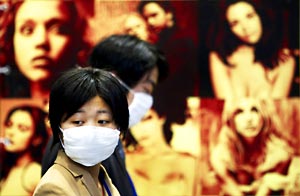Time Asia: Beijing's SARS Attack -- Doctor and party member insists there are many more cases than officials will admit
Tuesday, April 8, 2003

GUANG NIU/REUTERS A facemask-wearing couple pass a billboard in Beijing. How many cases are unreported? |
The doctor, Jiang Yanyong, 71, told TIME today he wrote the statement because he feels that "a failure to disclose accurate statistics about the illness will only lead to more deaths." Jiang says medical staff in Beijing's military hospitals were briefed about the dangers of SARS at the beginning of the National People's Congress in early March, but told not to publicize what they'd learned lest it interfere with the annual meeting of China's rubber-stamp legislative body. This has been confirmed by another physician at a Beijing-area hospital. After watching Zhang Wenkang's televised press statement last week, Jiang says he spoke to doctors and nurses at three Beijing military hospitals who expressed surprise and anger at the Minister's statement. As of today, Jiang says doctors at Beijing's No. 309 PLA Hospital told him they are treating 60 SARS patients and that seven patients have died of SARS. A duty officer at the No. 309 hospital reached for comment tonight said he "wasn't clear about this matter" and refused to provide information about SARS patients at the hospital.
The following are translated excerpts of Jiang's statement:
"On April 3rd, China's Minister of Health announced to the press that the Chinese government was already diligently dealing with the problem of SARS, and that the spread of the disease was already under control. He said that Beijing had 12 SARS cases and that three had died of the disease. I couldn't believe what I was hearing. The next day when I went to the hospital all the doctors and nurses who had seen Zhang's statement were furious. As a doctor who cares about people's lives and health, I have a responsibility to aid international and local efforts to prevent the spread of SARS.
This is what I learned from my colleagues:
Around the time of the convening of the National People's Congress and the Chinese People's Political Consultative Conference, Beijing's No. 301 Hospital admitted an old man. At the time he was very ill and thought to be possibly suffering from SARS. He was therefore sent to Beijing's No. 302 Hospital (an infectious diseases hospital) for treatment. At that time the doctors at No. 302 Hospital didn't have experience with the disease. In the process of treating him 10 doctors and nurses were infected with SARS. The old man was very sick and died two days after entering the hospital. His wife was admitted soon afterward and also died. Only at this time did officials from the Ministry of Health call a meeting of hospital leaders to inform them that Beijing now had cases of this disease, but that in order to ensure stability as the nation's two annual legislative assemblies got underway, hospital officials were forbidden to publicize what they'd learned about SARS.
That day after watching the Minister's statement, I telephoned colleagues at the No. 309 People's Liberation Army hospital. They had also seen the news and said that Zhang's statement was outrageous. As of yesterday their hospital (which the PLA general logistics department had designated its main hospital for SARS) had already admitted 60 SARS patients of whom 7 had died. Because No. 309 is already full to capacity the PLA general logistics department has again asked the No. 302 PLA Hospital to admit more patients. On April 6th the No. 302 PLA Hospital admitted five severely ill patients from the People's Armed Police."